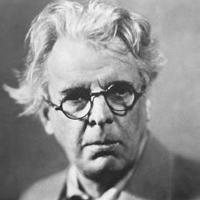Sailing to Byzantium by William Butler Yeats: Critical Appreciation
Yeats’s picture of old age is expressed beautifully in “Sailing to Byzanytium.” In the first stanza, Yeats speaks of a place that is “no country for old men.” In this country, the young, along with “fish, flesh, or fowl” engage in the procreative, generative energy of summer. Caught up in “sensual music,” the inhabitants of this country do not consider intellectual or spiritual concerns. Rather, they are caught up in life itself, not considering that which is eternal.

William B. Yeats (1865-1939)
Yeats reminds readers, however, that whatever is “begotten” and “born” ultimately dies. This is the country of fleshly incarnation, the country of life, but also a place where the joy of life opposes the certainty of death. A country such as this is no place for an old man moving inexorably toward death.
Yeats continues his exploration of old age in the second stanza, presenting an image of an old man as a scarecrow, “a tattered coat upon a stick.” This empty vessel is no more than a “paltry thing” without the singing of his soul. Through the soul’s singing, Yeats believes, he can create art, something that will survive physical death. He says, therefore, that he has sailed to Byzantium, a place where he will be able to learn the art of singing. Byzantium, now known as Istanbul, serves an important symbolic function in this poem.
Yeats expresses a growing concern with the problem age and the attitude appropriate to it. Old age, according to Yeats in the poem "Sailing to Byzantium", is a time to leave behind e sensual mire of the dying generations and to contemplate on the “artifice of eternity”. Old age is useless if at that time one does not respond to spirituality, or the souls claps and songs.
The opening stanza gives a richly concrete picture of instinctive life with the images of sensual delight occupying the young of all species that sing out of excitement. But they express the world of flux and death in perpetual motion. The old man has no place amidst this "sensual music". The only justification of old age is the contemplation of those artifacts which proclaim the glory of the spirit and unageing intellect above the transitory song of the body. Thus the poet in his old age makes his voyage to Byzantium-a journey from the sensual to the spiritual world. There he will choose the form of a golden bird whose song will be totally different from the "sensual music" of birds in the former country. Sailing to Byzantium can be interpreted as a journey from the sensual to the spiritual world. But there is much more involved in this complex poem. It symbolizes a psychological change from a mentality which values the pleasure of sexuality and the flesh, to one which values things of the mind, the spirit and the soul. "The poem can be taken on a number of levels-at the transition from sensual art to intellectual art: as the poet's new and brilliant insight into the nature of Byzantine imagination; and as the poet's coming to terms with age and death", as Cleanth Brooks observes.
The poem’s major theme is the transformative power of art; the ability of art to express the ineffable and to step outside the boundaries of self. Some concrete details of the poem might be read autobiographically, such as the speaker’s desire to leave his country, references to himself as an old man, “a tattered coat upon a stick”, and having a heart “sick with desire”. The speaker feels the desire to sail to Byzantium and metaphorically to transcend the sensual music of Ireland. He wants to transform his own consciousness and find mystical union with the golden mosaics of a medieval empire. “Sailing to Byzantium” explores many levels of aesthetic, spiritual, and intellectual transformation through which the poet’s journey starts far beyond his native land.
Cite this Page!
Sharma, K.N. "Sailing to Byzantium by William Butler Yeats: Critical Appreciation." BachelorandMaster, 24 May 2017, bachelorandmaster.com/britishandamericanpoetry/sailing-to-byzanytium-critical-appreciation.html.
Related Topics
Sailing to Byzantium: Introduction
The Scholars: Critical Analysis
The Theme of Immortality in Byzantium Poems
A Prayer for My Daughter: Analysis
Among School Children: Analysis
Crazy Jane Talks with the Bishop
The Lamentation of the Old Pensioner
He Wishes for the Clothes of Heaven
An Irish Airman Foresees his Death
When You Are Old: Summary and Analysis
William Butler Yeats as a Symbolist
Truth of Human Life in Yeats's Poetry
Yeats and the Romantic Tradition
The Salient Features of Yeats's Poetry
Biography of William Butler Yeats
 |
bachelorandmaster.com |